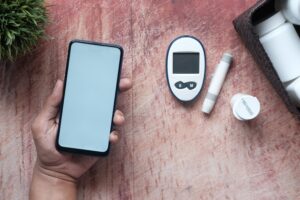Should I Wear a Continuous Glucose Monitor? (Plus 10 Tips for Blood Sugar Balance)
More and more wellness influencers seem to be recommending to their followers that they use a wearable medical device called a continuous glucose monitor – even if they do not have diabetes. But does it make sense for a non-diabetic who is experiencing symptoms of hormone imbalance or hair loss to wear a continuous glucose monitor?
What is a continuous glucose monitor?
A continuous glucose monitor is a wearable medical device that is typically fixed to the back of someone’s arm using a temporary adhesive. The device has a sensor that is inserted beneath the skin to measure glucose levels every five minutes. Most devices can be worn non-stop for as little as one week or as long as several months depending on which product is used. The glucose data that is collected can be stored and analyzed using an app so that wearers can view their data and discuss it with their healthcare providers.
Traditionally, continuous glucose monitors have been prescribed by healthcare providers for their patients that struggle to maintain clinically normal blood glucose (i.e., blood sugar) levels. Examples of patients that have historically used continuous glucose monitors include Type 1 diabetics, folks struggling with insulin-resistance and pre-diabetes, and Type 2 diabetics.
Why are some ‘influencers’ widely recommending continuous glucose monitors?
There has been a recent trend of some figures in the health and wellness industry recommending continuous blood glucose monitors more widely, including for people that do not struggle to maintain clinically normal blood glucose levels.
Some ‘influencers’ and alternative practitioners say that wearing a continuous glucose monitor as a non-diabetic helps to “optimize” glucose levels and prevent blood sugar spikes, which they say can cause inflammation.
It’s worth noting that some figures in this industry may also have an affiliate relationship with a continuous glucose monitor brand that enables them to generate revenue based on sales of the device.

Benefits of better blood glucose control
It’s indisputable that maintaining insulin sensitivity and/or having well managed blood sugar glucose levels is an important way to maintain our wellbeing. Our body requires tightly regulated blood glucose levels; blood sugar levels that go too high or too low in the extreme can result in serious injury and death. This is what makes continuous glucose monitors often essential to diabetics.
Higher levels of insulin can also have an impact on our hormone health; for example, insulin can increase the production of hair-harming androgenic hormones. Promoting and improving insulin sensitivity can help keep our insulin levels low and support more balanced hormones.
Read: Maybe It’s Not PCOS Hair Loss..
Poor blood glucose control can also generate inflammation that can contribute to chronic disease. For example, poorly regulated blood sugar has been shown to increase risk of heart disease.
How to measure the body’s ability to control blood glucose
Since maintaining healthy blood sugar levels is an important way to support our overall wellness, it’s important that we have effective ways to measure and track our body’s ability to control blood glucose.
The good news is that there are a number of routine blood tests that can be performed to assess our blood glucose and insulin levels. Here are some of our favorites:
- Fasting glucose: This measures your blood sugar levels while fasted (without food). It’s the most widely used test to assess for blood sugar issues and is usually included with the Comprehensive Metabolic Panel (CMP) and often measured annually.
- Normal lab range: <99 mg/dL
- Functional range: <89 mg/dL
- Fasting insulin: This test measures how much of the hormone insulin is present in a serum sample while your body is fasted. Many functional practitioners consider this a better assessment of insulin sensitivity (and blood sugar control) compared to fasting glucose.
- Normal lab range: <25 mIU/L
- Functional range: <5 mIU/L
- Glycated hemoglobin (HbA1c): Whereas the first two tests are assessments corresponding to a moment in time (e.g., what your blood glucose levels are right now), glycated hemoglobin is actually a measure of how well your body has regulated your blood sugar over the last 90 days.
- Normal lab range: <5.7%
How often do you need to measure your blood glucose levels?
How frequently you need to test your blood glucose levels depends on your health. For example, a diabetic would need to assess their blood glucose levels anywhere between a few times a week to several times per day.
Generally, healthy people (non-diabetic, non-prediabetic folks) only need to measure their body’s ability to control their blood glucose levels 1-2 times per year. This is much less frequently than the 2,016 individual blood glucose values that you could get from wearing a continuous glucose monitor for just one week.
What are the potential dangers of wearing a continuous glucose monitor?
Some proponents of continuous glucose monitors for non-diabetics may present it as an intervention that has no downside. But, as with anything, it’s good to consider it from all angles.
Even when something may convey a health benefit, it’s important to weigh the ‘side effects’, if you will. One potential danger for non-diabetics wearing continuous glucose monitors is that it promotes disordered eating by causing a hyperactive awareness and unhealthy compulsion to manipulate food intake based on its perceived impact on blood glucose levels.
Similarly, it encourages people to place too much emphasis on diet to promote better blood sugar control. There are many factors outside of which foods we eat that can help us maintain healthy blood glucose levels (see the next section below).
Read: Why We’ve Embraced Health At Every Size
The third potential danger of non-diabetics wearing continuous glucose monitors is that it can lead to shortages for those who truly need these devices. Many diabetics rely on continuous glucose monitors; they have an actual medical need for these devices. A surge in otherwise healthy individuals requesting continuous glucose monitors as a novelty can not only be interpreted as disrespectful to those with serious medical conditions but could also lead to device shortages impacting those who need the devices most.

How to support balanced blood sugar levels
What specific strategies will help someone improve their blood glucose control will vary person to person. Here are some general strategies that may help support blood sugar control:
- Eat consistently (avoid skipping meals)
- Include proteins, fats and fiber with your meals
- Address nutrient deficiencies
- Limit your caffeine intake
- Reduce or avoid alcohol
- Prioritize sleep
- Manage stress levels
- Move your body more (take breaks to stretch or walk throughout the day)
- Strength train regularly
- Be mindful of your body’s toxic burden



